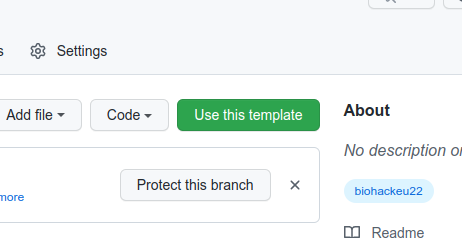Minimal example of a BioHackrXiv publication that can be generated with the Preview Service.
This repository is a template repository. This means you can hit the green "Use this template" button to use it as a template to start a new BioHackrXiv Publication:
The publication Markdown is found in the paper/paper.md file. At the top you can edit the
YAML code with metadata. It is important to get this part correct, because otherwise the PDF
generation will fail. The metadata looks like this:
title: 'BioHackJP 2023 Report R1: linked data standardization with LLMs'
title_short: 'BioHackJP 2023 LD-LLM'
tags:
- Linked Data
- Large Language Models
authors:
- name: First Author
orcid: 0000-0000-0000-0000
affiliation: 1
- name: Last Author
orcid: 0000-0000-0000-0000
affiliation: 2
affiliations:
- name: First Affiliation
index: 1
- name: Second Affiliation
index: 2
date: 30 June 2023
cito-bibliography: paper.bib
event: BH23JP
biohackathon_name: "BioHackathon Japan 2023"
biohackathon_url: "https://2023.biohackathon.org/"
biohackathon_location: "Kagawa, Japan, 2023"
group: R1
# URL to project git repo --- should contain the actual paper.md:
git_url: https://github.com/biohackathon-jp/bh23-report-template
# This is the short authors description that is used at the
# bottom of the generated paper (typically the first two authors):
authors_short: First Author \emph{et al.}The following fields should be changed:
- title
- title_short
- tags
- authors
- affiliations
- date
- group
- authors_short
Particularly important to update is the following field, which should point to your clone of the template, instead of the template itself:
This repository can be converted into a preview PDF with BioHackrXiv Preview Server.
The preview website asks for the link to your repository and will automatically find the paper.md and create an PDF.
The document uses Markdown and you can look at this tutorial.
Please keep sections to a maximum of only two levels with ##.
Tables can be added in the following way, though alternatives are possible:
| Header 1 | Header 2 |
|---|---|
| item 1 | item 2 |
| item 3 | item 4 |
Table: Note that table caption is automatically numbered.
A figure is added with:
Lists can be added with:
- Item 1
- Item 2
You can use CiTO annotations, as explained in this BioHackathon Europe 2021 write up and this CiTO Pilot. Using this template, you can cite an article and indicate why you cite that article, for instance DisGeNET-RDF [@citesAsAuthority:Queralt2016].
Possible CiTO typing annotation include:
- citesAsDataSource: when you point the reader to a source of data which may explain a claim
- usesDataFrom: when you reuse somehow (and elaborate on) the data in the cited entity
- usesMethodIn
- citesAsAuthority
- discusses
- extends
- agreesWith
- disagreesWith

